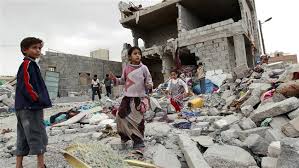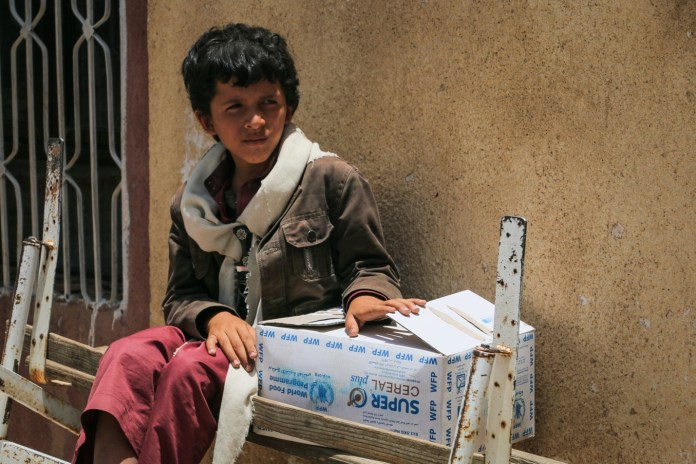The West Doesn’t Care About the People It Kills
The media reserves its rage for the crimes of our enemies.

All Global Research articles can be read in 51 languages by activating the “Translate Website” drop down menu on the top banner of our home page (Desktop version).
To receive Global Research’s Daily Newsletter (selected articles), click here.
Visit and follow us on Instagram at @globalresearch_crg and Twitter at @crglobalization.
***
The west doesn’t care about the people it kills. Part of the evidence for this has been on the front pages of every newspaper and on every news show since Russia launched the Ukrainian invasion. The rest of the evidence is what has been missing on the front pages of the newspapers and TV shows. The contrast makes the point.
You see no universal Western outrage over the US support for the Saudi blockade on Yemen. The war had killed an estimated 377,000 by the end of 2021, the majority of them children dead of famine. We see an occasional story but nothing remotely like the moral outrage over the Ukrainian invasion. The children are Arabs and we are supporting the ones most responsible for killing them.
And then there are our sanctions on Afghanistan and the American theft of their money. In that link, Ezra Klein in the New York Times attributes good intentions to Biden officials but makes it clear what the obvious results will be—immense suffering and death. He suggests they might be blinded by their ideology, unable to zoom out from it.
WFP Provides Food Assistance to a Record 7 Million People In Yemen In August 2017. UN World Food Program. [Source: wfp.org]
And then there are the sanctions we are imposing on various countries such as Iran, Syria and Venezuela. These sanctions are designed precisely to pressure governments by causing suffering and in the end, increased mortality rates among the population. Richard Nephew who designed the sanctions imposed on Iranduring the Obama Administration explicitly admits that sanctions are meant to cause pain in his book “The Art of Sanctions”. (The “look inside” feature on Amazon shows enough to see Nephew’s declaration about the purpose of sanctions being the inflicting of pain.)
And of course there is the ongoing American support for the apartheid state of Israel, with photos of brutality against Palestinians which people have falsely attributed to the Russian invasion.
All of these things are happening right now and the Yemen and Afghanistan crises involve mass death, with a child dying of war-caused famine every nine minutes in Yemen and the possibility of worse in Afghanistan.
There hasn’t been anything close to the level of outrage or calls for action on these issues as there has been for the Ukraine invasion. The Russian invasion has its own uniquely dangerous and terrifying feature because there is the very real danger of a nuclear war breaking out due to escalation and miscalculation. But most of the outrage has been directed towards the war itself and Putin’s responsibility for the suffering. If this outrage were motivated by genuine universal concern for human life, we would be seeing daily photos or at least references to the children dying in Yemen and this would be linked to our support for the Saudis, but we don’t.
The recent Atlantic profile of Mohammed bin Salman refers to the humanitarian crisis in Yemen, but says nothing about the Saudi blockade. It only references US attempts to cut back on Saudi bombing of civilians, implying that we are the good guys– but the Saudis are using American planes dropping American bombs. The Houthis are not innocents either, but there is a liberal coating of whitewash given to American responsibility in Yemen.
That said, over the past 20 years no American who has paid attention to the news and becomes exercised over political issues can legitimately claim ignorance. As bad as the mainstream press usually is, as laced with bias and jingoism as it tends to be, there has been enough accurate reporting for people to know that the US commits war crimes or supports others who do, and these are not simply the excesses of the occasional soldier but are in fact policy.
Sanctions are policy. Blockades are policy. Massive bombing of civilians in Raqqa and Mosul was policy. Support for Israel no matter what it does to Palestinians is policy.
And yet little of this knowledge is reflected in our political culture, and European countries are no better. People act as though Putin’s brutality is some uniquely awful thing that “civilized” people would never do to other “civilized” people in our enlightened era. And all of these attitudes become part of everyday life. On my daily commute I just started seeing a church with a big blue and yellow banner saying “Pray for Ukraine”. In the many years I have driven past that church I don’t recall ever seeing a banner about Yemen or Gaza.
Why are we so brutally callous towards our own victims? The question partly answers itself. People don’t like to admit that the politicians they support, both Democrats and Republicans, are implicated in war crimes. So they ignore them or worse, justify them. It is easy to criticize, Democratic partisans will say. Republicans barely even bother to care (with a few exceptions).
The rest of the explanation, of course, is a mixture of racism and ethnocentrism. There is an explicit admission by some reporters and others that they care about Ukrainians because they look like “us” ( white people are “us”, apparently), and Ukraine is a “civilized” (white) place. At other times I have seen people state in so many words that our actions that plunge other countries into chaos are not so bad because they would be killing each other anyway.
But most important is the role of the press. As stated before, the Western press sometimes does report on Western atrocities, but with nothing like the level and quantity of moral outrage they reserve for the crimes of our enemies. People may think they can rise above this, but observation suggests this is largely false. If there isn’t a constant drumbeat of stories about our atrocities as there is for Putin’s, and pundits aren’t constantly agonizing over our need to do something, the unspoken message is that our crimes simply aren’t that important or bad. And there is always the social pressure to conform. And people absorb this message. They are embarrassed by the wrong kind of moral outrage. It isn’t normal and not the sort of thing you see serious people doing. That said, an explanation is not an excuse.
In the current climate of extreme stupidity the standard reaction to my argument would be that it is an example of “whataboutism.” Yes, that is exactly what it is, and only a moral imbecile would think there is something wrong with it because of that.
When people are behaving like hypocrites, denouncing one set of crimes committed by their enemies and ignoring, excusing or actually advocating the crimes committed by their own country or its allies, you should say to those people “what about the crimes your country supports”? And we aren’t even comparing past crimes committed by the US with current crimes committed by Putin. All of these crimes are occurring now.
Two more points. There are several pieces published recently where people try to outline a morally consistent anti-war position, where lefties oppose both American imperialism and imperialism by other countries such as Russia. This is a fine goal, and do it because it is right, but don’t do it because you think it will gain you more credibility with mainstream liberals. The ideology of mainstream liberalism requires them to see themselves as “civilized”. They may make tragic mistakes but always with good intentions. It can’t be that they are supporters of a system that has them making the same types of “tragic mistakes” over and over again. They are nice people. They can’t possibly be as guilty as someone like Putin. I am not being sarcastic. People in the Western world who make the decisions or identify with those who make the decisions are not going to accept a truly principled anti war critique. They will see the equation of their crimes with Putin’s as “whataboutism” and therefore not serious. Ezra Klein bumped up against that attitude ( we are the good guys doing our best) in the officials he questioned when writing his post on our Afghanistan policy. If these people accepted the anti war critique they would have to resign and speak out. Fundamentally Western liberals who consider themselves serious people cannot admit to themselves that Western leaders might be morally as responsible for war crimes as someone like Putin. It can’t be accepted. It also means that even when they do admit something is wrong, like Yemen or Afghanistan, it has to be seen as a tragic mistake by well intentioned people and not the result of an ideology and attitudes which keep leading to such “mistakes”. Tony Blinken is this nice soft-spoken guy but I gather he was in favor of both the Iraq invasion and the decision to support the Saudi war in Yemen. All liberals care about is that he is a nice guy (which I think he is), like them.
And finally, having condemned brutal sanctions, including the ones we may level on Russia (Russians are considered “them”, btw), how could I support BDS? Speaking only for myself, it is because BDS is largely symbolic and not remotely lethal. The reaction of Israel and its supporters demonstrates this. On the one hand they laugh off the effects as trivial economically, which they are, but on the other hand they react with near hysterical accusations of antisemitism if some musician or author refuses to perform in Israel or have a book translated by some Israeli firm. The symbolism frightens them.
It is impossible to imagine that the “civilized” West would ever allow “civilized” Israel to be subjected to the sorts of brutal sanctions that “civilized” nations inflict on “uncivilized” nations. So I don’t have to face the moral dilemma but what if it happened? One could decide based on what Palestinians themselves actually living there would say, because they as the people with no power are the ones who would suffer the most. Perhaps they would be united in favor of sanctions that would hit them hard. I would still not want to be responsible for killing people.
Gazan artist killed by Israeli soldiers (Source: Just World Educational)
Meanwhile, in the real world, being a citizen of the US, I already am responsible for killing people. We are doing exactly that to various countries, and Gazans are living in a giant prison camp, so the preceding paragraph amounted to moral posturing regarding a situation that Western nations would never allow to happen to one of their own. Westerners inflict sanctions that hurt people living under authoritarian governments, hoping to see people suffer so much they might rebel or at least pressure their respective government to change course.
But somehow affluent citizens of democratic countries are never seen as suitable subjects for targeted sanctions even though they should have far more control over their own country’s actions. One can’t easily target only the guilty classes on a large scale (you can hit individual oligarchs or dictators or in theory American politicians) which is why sanctions in practice, the ones imposed on an entire country, generally hit the poor the hardest. And Westerners are fine with that.
Two concluding notes.
1. There are very early examples of the validity of whataboutism in the Bible. Notably in the famous line from the Sermon on the Mount, where Matthew quotes Jesus: “Thou hypocrite, first cast out the beam out of thine own eye; and then shalt thou see clearly to cast out the mote out of thy brother’s eye.”
2. Here is a later example of a hypocrite objecting to a legitimate question regarding accountability.
Last June Nancy Pelosi and the Democratic leadership issued a statement rejecting Rep. Ilhan Omar’s criticisms of American and Israeli actions. “[D]rawing false equivalencies between democracies like the U.S. and Israel and groups that engage in terrorism like Hamas and the Taliban foments prejudice and undermines progress toward a future of peace and security for all,” the leaders said.
What triggered the hypocrites? Omar questioned Secretary of State Antony Blinken about the International Criminal Court prosecuting war crimes:
I know you opposed the court’s investigation in both Palestine and in Afghanistan. I haven’t seen any evidence in either cases that domestic courts both can and will prosecute alleged war crimes and crimes against humanity. And I would emphasize that in Israel and Palestine, this includes crimes committed by both the Israeli Security Forces and Hamas. In Afghanistan, it includes crimes committed by the Afghan national government and the Taliban.
Blinken responded to Omar that the US and Israel are accountable. This is ludicrous. And as someone who was part of the decision to give the Saudis the green light on bombing Yemen, he shouldn’t be speaking about accountability.
*
Note to readers: Please click the share buttons above or below. Follow us on Instagram, @globalresearch_crg and Twitter at @crglobalization. Forward this article to your email lists. Crosspost on your blog site, internet forums, etc.
Featured image: Yemen children impacted by genocidal war (Credits to the owner of the photo)



